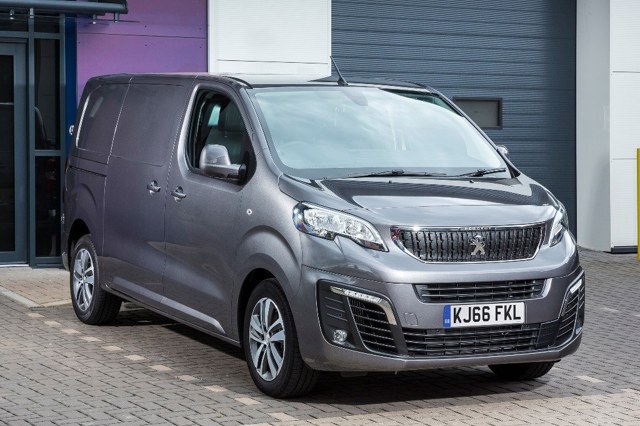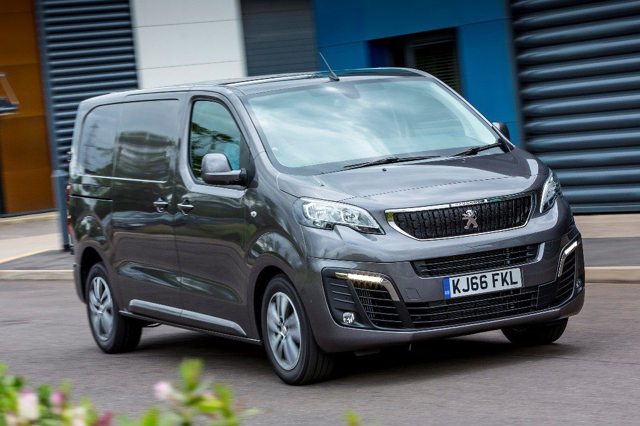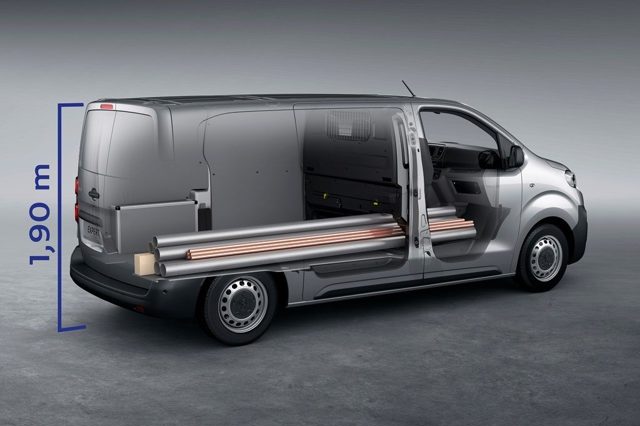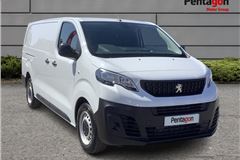Peugeot Expert Review 2025
Peugeot Expert At A Glance
The Peugeot Expert is a stylish and modern van that blends low running costs with big load moving potential. Powered by an efficient range of four-cylinder diesels, the Expert will officially exceed 50mpg and carry payloads weighing up to 1400kg.
To drive, it's surprisingly car-like, although the Expert's creaky interior does raise a few concerns when it comes to build quality. It's built at the same French factory as the Citroen Dispatch and Toyota Proace.
There are three body sizes and two wheelbase lengths to choose from and it can be specified as a van or crew cab, with panel or glazed/semi-glazed size walls. Peugeot only offers one roof height, which means all versions of the Expert will fit into a multi-storey car park.
Under the bonnet the Expert is offered with the choice of 1.6 or 2.0-litre diesel engines, with the standout performer the 115PS 1.6 HDi that will officially return 54.3mpg. That's impressive when you consider that the leanest Transit Custom claims 47.1mpg, while the T6 Transporter is advertised with 47.9mpg.
The Expert is a good van to drive, with responsive steering and a willingness to change direction at speed. The van also impresses in town, with nimble handling that makes parking easy. Indeed, with a turning circle starting from 11.3 metres, the Expert will outperform most family cars when it comes slotting into a space or performing a three-point turn.
Power ratings for the four-cylinder engines vary from 95PS to 180PS. Most engines get a slick six-speed manual gearbox as standard, although 95PS units are matched to somewhat clunky five-speed transmissions. Those wanting the range-topping 180PS unit will get a fully fledge six-speed auto.
Most of the engines will cover motorway miles in comfort, with decent mid-gear pull and low levels of road noise. The only disappointment in the range is the 95PS 1.6 HDi, which is quote vocal under hard acceleration. The turbo is also noisy at low speeds, which means it can grate after a long day behind the wheel.
The Expert does raise some concerns when it comes to build quality. Some of the interior plastics have a tendency to rattle over bumpy roads and the attention to detail in the cabin is lacking compared to the Ford Transit Custom and Volkswagen Transporter. That said, the Expert is considerably cheaper to buy and run than its key rivals, which combined with its heavy duty load moving potential, makes it a winner for money-conscious builders and delivery drivers.
Essential knowledge: 10 things you need to know about the Peugeot Expert
Driving the Peugeot Expert
The Peugeot Expert is surprisingly car-like on the road, with nicely weighted steering and a composed ride that makes it a comfortable drive across all speeds.
Like the its sister vans – the Citroen Dispatch and Toyota Proace – the Expert is based on a heavily modified version of the of the Peugeot 308 car platform, which gives the impression that you're driving a large family car rather than a commercial vehicle.
This means the Expert is predictable and easy to drive. It doesn't bounce around when empty and the front-wheel drive layout provides plenty of grip in challenging conditions, such as heavy rain or light snow. Turning circles vary from 11.3 metres to 12.4 metres, which makes the Expert painless to park in town too.
The four-cylinder turbodiesels are split across 1.6-litre and 2.0-litre units and provide from 95PS up to 180PS. The range starts with the 95PS 1.6 BlueHDi, which is also the weakest engine in the range. There's lots of noise and sluggish acceleration when carrying a full load.
The five-speed manual gearbox doesn't help matters, with a clunky and slow operation, although a torque converter auto is available as an option. CO2 emissions for the 95PS diesel start from 144g/km and claimed economy ranges from 50.4 - 51.4mpg, depending on which transmission and body size you choose.
The 1.6-litre HDi is also available with 115PS and this is the sweet spot in the range, with a claimed 55.4mpg and 133g/km of CO2. There is no automatic option for the 115PS engine, but the six-speed gearbox is extremely good with a smooth upward and downshift.
The engine feels much smoother under acceleration too, while the lower noise levels allow you to join a fast flowing motorway without the radio being drowned out by the din of the engine.
Peugeot's excellent BlueHDi 2.0-litre diesel is also available, with higher levels of refinement and more torque. However, while all three versions - 120PS, 150PS and 180PS - impress with more power, faster acceleration and lower noise levels, they will only make sense if you plan to utilise the Experts' towing ability.
Both the 120PS and 150PS engine will shift 2.5 tonnes when hooked to a braked trailer, while the 180PS - which is limited to a full six-speed automatic - will pull 2.2 tonnes. Claimed economy for the 2.0 HDi engines range from 45.6mpg to 53.3mpg.
Standard safety kit is good across the range, with hill-start assist - this prevents the van from rolling backwards - vehicle stability control and tyre pressure monitoring all included. Peugeot's Grip Control system is also available on most models, which provides enhanced traction control in mud, snow and ice.
Peugeot Expert interior
It might handle like a car, but the Peugeot Expert is very much geared up for life as a working van. Payloads range from just under 1100kg to just over 1400kg depending on size, number of seats and engine spec.
There are three load lengths to choose from - compact, standard and long - and the Expert is available as a panel van, crew cab or chassis cab.
Load volumes range from 5.1 cubic metres to 6.6 cubic metres and all vans can be specified with the Moduwork load-through bulkhead, which extends the load length of the van up to four metres.
There are no choice in heights, however, which means all vans are restricted to a load area that measures 1.6 metres wide and 1.4 metres high. As a result, even the largest Expert trails behind the Ford Transit Custom, Renault Trafic and Volkswagen Transporter when it comes to outright space.
The Expert does get a comfortable cabin, however, with hard wearing but supportive seats that are well suited for long stints behind the wheel. The interior is easy to clean too, with chunky trims and a tough plastic floor that can be given a once over with a wet cloth.
Three seater models add extra versatility, with the centre seat folding down to double up as table and there is also a useful storage compartment under the middle seat to hide valuables.
The raised seating position provides an excellent view of the road and the driver's seat has lots of height, rake, reach and lumbar adjustment. The layout of the dashboard is practical with a simple layout that is flanked by cup holders.
However, with each one positioned at opposite ends of the dashboard, it can be tricky to use both if you're on your own in the van. That said, the deep door bins are large enough to store a flask and the additional upper shelf in the door has a useful lip that prevents items from rolling out when you turn a tight corner.
Most of the build quality in the cabin is solid, but we did notice some of the plastics creaking when the Expert navigates bumpy roads. We also noticed movement in some of the dashboard plastics, which again raises some concerns about the longevity of the interior. The side sliding door mechanism also feels a little flimsy.
There are three trim levels to choose from - S, Professional and Professional Plus - but even the basic versions get twin sliding side doors, cruise control, DAB radio and Bluetooth as standard. Mid-trim models get air con, a seven-inch touchscreen for the cabin and the Moduwork load-through bulkhead. The range topping Professional Plus adds alloy wheels, LED daytime running lights and body coloured bumpers.
Model History
- April 2016: New Peugeot Expert launched
- April 2016: Pricing for Peugeot Expert confirmed
- December 2019: Peugeot adds Sport Edition to the Expert panel and crew van model ranges
April 2016
New Peugeot Expert launched
Born out of a collaboration between Citroen, Peugeot and Toyota, the new Expert is powered by a new range of 1.6 and 2.0-litre diesel engines returning up to 55mpg. Most engines are linked to a six-speed manual gearbox as standard, but the powerful 2.0-litre with 180PS will be aligned with a six-speed automatic and return a claimed 46.3mpg. All will use AdBlue, which will cover roughly 9000 miles before it need replenishing via the exterior filling flap.
Available in three load lengths, the Peugeot Expert will carry 1400kg and tow a maximum 2.5 tonnes when hooked up to a braked trailer. The maximum load length for compact versions will be 3.3 metres, but this will increase to more than 4.0 metres with the long wheelbase versions.
All vans will carry three Euro pallets with ease and feature smart storage options, with a large hatch built into the bulkhead to maximise the full load length of the van.
April 2016
Pricing for Peugeot Expert confirmed
The all-new Expert is offered with a choice of three, well-equipped panel van trim levels: Expert S, Expert Professional and Expert Professional Plus and will also come as a Platform Cab and Crew Van.
| New PEUGEOT Expert S | Basic Price* |
| BlueHDi 95 manual Compact 1000 S | £17,495 |
| BlueHDi 95 S&S ETG6 Compact 1000 S | £18,275 |
| BlueHDi 115 S&S 6-speed manual Compact 1000 S | £18,295 |
| BlueHDi 120 S&S 6-speed manual Compact 1400 S | £18,695 |
| BlueHDi 150 S&S 6-speed manual Compact 1400 S | £19,795 |
| BlueHDi 180 S&S EAT6 Compact 1300 S | £22,795 |
| BlueHDi 95 manual Standard 1000 S | £18,195 |
| BlueHDi 95 S&S ETG6 Standard 1000 S | £18,975 |
| BlueHDi 115 S&S 6-speed manual Standard 1000 S | £18,995 |
| BlueHDi 120 S&S 6-speed manual Standard 1400 S | £19,395 |
| BlueHDi 150 S&S 6-speed manual Standard 1400 S | £20,495 |
| BlueHDi 180 S&S EAT6 Standard 1250 S | £23,495 |
| BlueHDi 95 manual Long 1200 S | £19,095 |
| BlueHDi 95 S&S ETG6 Long 1200 S | £19,875 |
| BlueHDi 120 S&S 6-speed manual Long 1400 S | £20,295 |
| BlueHDi 150 S&S 6-speed manual Long 1400 S | £21,395 |
| BlueHDi 180 S&S EAT6 Long 1250 S | £24,395 |
| New PEUGEOT Expert Professional | Basic Price* |
| BlueHDi 95 manual Compact 1000 Professional | £18,845 |
| BlueHDi 95 S&S ETG6 Compact 1000 Professional | £19,625 |
| BlueHDi 115 S&S 6-speed manual Compact 1000 Professional | £19,645 |
| BlueHDi 120 S&S 6-speed manual Compact 1400 Professional | £20,045 |
| BlueHDi 150 S&S 6-speed manual Compact 1400 Professional | £21,145 |
| BlueHDi 180 S&S EAT6 Compact 1300 Professional | £23,545 |
| BlueHDi 95 manual Standard 1000 Professional | £19,545 |
| BlueHDi 95 S&S ETG6 Standard 1000 Professional | £20,325 |
| BlueHDi 115 S&S 6-speed manual Standard 1000 Professional | £20,345 |
| BlueHDi 120 S&S 6-speed manual Standard 1400 Professional | £20,745 |
| BlueHDi 150 S&S 6-speed manual Standard 1400 Professional | £21,845 |
| BlueHDi 180 S&S EAT6 Standard 1250 Professional | £24,245 |
| BlueHDi 95 manual Long 1200 Professional | £20,445 |
| BlueHDi 95 S&S ETG6 Long 1200 Professional | £21,225 |
| BlueHDi 120 S&S 6-speed manual Long 1400 Professional | £21,645 |
| BlueHDi 150 S&S 6-speed manual Long 1400 Professional | £22,745 |
| BlueHDi 180 S&S EAT6 Long 1250 Professional | £25,145 |
| New PEUGEOT Expert Professional Plus | Basic Price* |
| BlueHDi 120 S&S 6-speed manual Compact 1400 Professional Plus | £21,645 |
| BlueHDi 150 S&S 6-speed manual Compact 1400 Professional Plus | £22,745 |
| BlueHDi 180 S&S EAT6 Compact 1300 Professional Plus | £25,145 |
| BlueHDi 120 S&S 6-speed manual Compact 1400 Professional Plus | £22,345 |
| BlueHDi 150 S&S 6-speed manual Standard 1400 Professional Plus | £23,445 |
| BlueHDi 180 S&S EAT6 Standard 1250 Professional Plus | £25,845 |
| BlueHDi 120 S&S 6-speed manual Long 1400 Professional Plus | £23,045 |
| BlueHDi 150 S&S 6-speed manual Long 1400 Professional Plus | £24,145 |
| BlueHDi 180 S&S EAT6 Long 1250 Professional Plus | £26,545 |
| New PEUGEOT Expert Platform Cab | Basic Price* |
| BlueHDi 95 manual 1200 S | £17,425 |
| BlueHDi 120 S&S 6-speed manual 1400 S | £18,625 |
| New PEUGEOT Expert Crew Van | Basic Price* |
| BlueHDi 120 S&S 6-speed manual Standard 1400 Professional | £20,045 |
| BlueHDi 120 S&S 6-speed manual Long 1400 Professional | £24,195 |
December 2019
Peugeot adds Sport Edition to the Expert panel and crew van model ranges
The Sport edition is positioned above the Asphalt trim level and benefits from even more standard equipment.
Additional equipment for Sport Edition models includes: 17-inch Black Phoenix alloy wheels, Sports decals on the sides and rear of the van and dual zone automatic air conditioning. Expert Sport Edition will be available in three colours: Cumulus Grey, Bianca White and Nera Black. All models will be based on the Expert Standard wheelbase. Payload and load volume are the same as the standard panel and crew vans.
Expert Sport Edition starting prices
Expert Panel Van Sport Edition BlueHDi 120 S&S 6-speed manual 1400: £29,460
Expert Crew Van Sport Edition BlueHDi 150 S&S 6-speed manual 1400: £33,480
Expert Panel Van Sport Edition BlueHDi 180 S&S EAT8 Auto 1200: £32,960
Expert Crew Van Sport Edition BlueHDi 180 S&S EAT8 Auto 1200: £35,880









 Efficient and easy to drive everyday will tow 2.5 tonnes, 1400kg payload capacity.
Efficient and easy to drive everyday will tow 2.5 tonnes, 1400kg payload capacity.
 Entry-level engines are noisy, some build quality concerns, no high-roof option.
Entry-level engines are noisy, some build quality concerns, no high-roof option.


